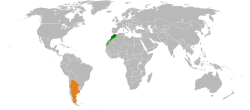 | |
Morocco | Argentina |
|---|---|
Foreign relations between the Argentine Republic and the Kingdom of Morocco, have existed for over half a century. Both countries are full members of the Group of 77.
 | |
Morocco | Argentina |
|---|---|
Foreign relations between the Argentine Republic and the Kingdom of Morocco, have existed for over half a century. Both countries are full members of the Group of 77.

Argentina recognized Morocco's independence in 1956. Both countries established diplomatic relations in 1960. Argentina was one of the first countries recognizing Morocco's independence in 1956.
In 2003, former president of Argentina Eduardo Duhalde, renewed Buenos Aires' backing to Morocco's territorial integrity. In this era of globalisation, Argentina would not tolerate separatism and the creation of microscopic entities, [1] the Argentine president said at a meeting in Buenos Aires with Ahmed Kadiri, vice-speaker of the Moroccan chamber of advisors, upper house of parliament.
Argentine ambassador in Morocco, Edgardo Piuzzi, in 2003 said that his country does not recognize Polisario and has always denounced the situation in Tindouf camps, [2] in South Western Algeria. In an interview published by the Moroccan daily in Arabic Assahraa Al Maghribia, the Argentine diplomat termed as shameful the detention of Moroccan prisoners in Tindouf camps, for more than twenty five years, adding that Argentina has always upheld a clear stance: The Sahara is indubitably Moroccan. [2]
Morocco and Argentina signed in Rabat (2000) three major agreements on trade, fisheries and cooperation between the Moroccan Export Promotion Center (CMPE) and Argentine counterpart. [3] The documents were initialed by foreign affairs minister Mohamed Benaissa and external relations minister of Argentina during the closing ceremony held in Rabat. Benaissa noted that the commission works were successful with the adoption of a large number of projects in the sectors of agriculture, fishery, housing, city planning, energy and mines, industry, equipment, tourism, investment, culture, education, scientific research and vocational training.[ citation needed ]
In 2016, Argentine exports to Morocco amounted to US$368.7 million and Moroccan exports to Argentina amounted to US$107.4 million. [4]
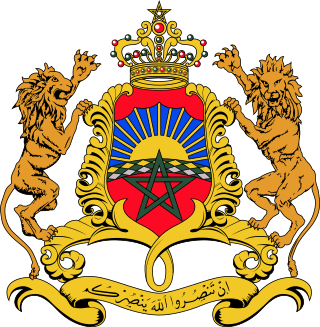
Morocco is a member of the United Nations and belongs to the African Union, Arab League, Arab Maghreb Union (UMA), Organisation of Islamic Cooperation (OIC), the Non-Aligned Movement and the Community of Sahel-Saharan States (CEN-SAD). Morocco's relationships vary greatly between African, Arab, and Western states. Morocco has had strong ties with the West in order to gain economic and political benefits. France and Spain remain the primary trade partners, as well as the primary creditors and foreign investors in Morocco. From the total foreign investments in Morocco, the European Union invests approximately 73.5%, whereas the Arab world invests only 19.3%. As of 2009, many countries from the Persian Gulf and Maghreb regions are also becoming more involved in large-scale development projects in Morocco.

Western Sahara, formerly the Spanish colony of Spanish Sahara, is a disputed territory claimed by both the Kingdom of Morocco and the Popular Front for the Liberation of the Saguia el Hamra and Rio de Oro, which is an independence movement based in Tifariti and Bir Lehlou. The Annexation of Western Sahara by Morocco took place in two stages, in 1976 and 1979, and is considered illegal under international law.
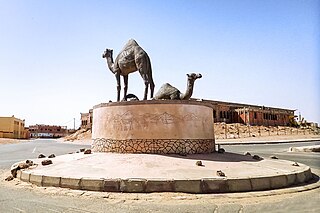
Tindouf, also written Tinduf, is the westernmost province of Algeria, having a population of 58,193 as of the 2008 census. Its population in reality could be as high as 160,000 because of the Sahrawi refugee camps. Despite the barren landscape, Tindouf is a resource-rich province, with important quantities of iron ore located in the Gara Djebilet area close to the border with Mauritania. Prior to Algerian independence, the area served as a strongpoint of several tribes of the nomadic Reguibat confederation.

The Government of Morocco sees Western Sahara as its Southern Provinces. The Moroccan government considers the Polisario Front as a separatist movement given the alleged Moroccan origins of some of its leaders.
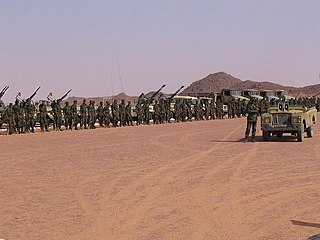
The Western Sahara conflict is an ongoing conflict between the Sahrawi Arab Democratic Republic/Polisario Front and the Kingdom of Morocco. The conflict originated from an insurgency by the Polisario Front against Spanish colonial forces from 1973 to 1975 and the subsequent Western Sahara War against Morocco between 1975 and 1991. Today the conflict is dominated by unarmed civil campaigns of the Polisario Front and their self-proclaimed SADR state to gain fully recognized independence for Western Sahara.

The Royal Advisory Council for Saharan Affairs is an advisory committee to the Moroccan government on Western Sahara. It was created under Mohammed VI in early 2006, after a new autonomy plan proposed by Morocco to replace the United Nations' Baker Plan. The Polisario Front opposes Morocco's autonomy plan, demanding for a referendum and independence.

The politics of the Sahrawi Arab Democratic Republic refers to politics of the Polisario Front's proclaimed Sahrawi Arab Democratic Republic, a country in North Africa with limited recognition by other states, controlling parts of the Western Sahara region.

Foreign relations between Argentina and Greece have existed for about half a century. Both countries are represented by an embassy in the other one's capital. According to the Greek foreign ministry, at least 50,000 persons of Greek descent live in Argentina with about 5,000 with Greek passports. The majority of Greeks live in Buenos Aires.

Diplomatic relations between the Argentine Republic and Ukraine, have existed for decades. The importance of relations centers on the history of Ukrainian migration to Argentina. Ukrainians in Argentina form the second largest Ukrainian community in Latin America numbering approximately 250,000 Ukrainians and their descendants.
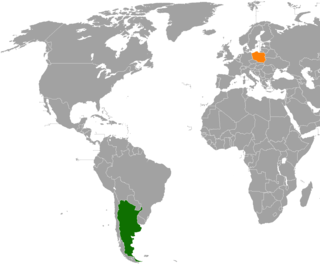
Diplomatic relations between Argentina and Poland, have existed for over a century. Over 500,000 Argentines are of Polish descent making Argentina the second Latin-American country with the largest Polish community abroad.

The Armenian community in Argentina is the largest in Latin America totaling approximately 120,000 members.

Current and historical relations between the Argentine Republic and the Russian Federation have existed for decades. Both nations are members of the G20 and the United Nations.

Morocco–Russia relations are the bilateral relations between the Kingdom of Morocco and the Russia Federation. Morocco has an embassy in Moscow, while Russia has an embassy in Rabat and a consulate general in Casablanca.

Morocco-Egypt relations refers to the bilateral relations between Morocco and Egypt. Since independence, the two nations have maintained warm relations. Egypt has an embassy in Rabat. Morocco has an embassy in Cairo. Both countries are members of the African Union, Arab League, GAFTA, Non-Aligned Movement, Group of 77, Organisation of Islamic Cooperation, and the Council of Arab Economic Unity.
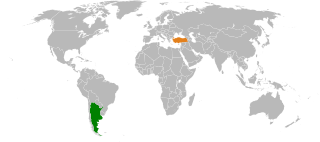
Foreign relations between Argentina and Turkey, have existed for over a century. Argentina has an embassy in Ankara and Turkey has an embassy in Buenos Aires. Turkey's staunch support for fellow NATO member United Kingdom during the Falklands War and the recognition of the Armenian genocide by the Argentine parliament have soured relations between the two countries.
The Sahrawi Arab Democratic Republic (SADR) was proclaimed by the Polisario Front on 27 February 1976, in Bir Lehlu, Western Sahara. SADR claims sovereignty over the entire territory of Western Sahara, a former Spanish colony; however, at present the SADR government controls approximately 20–25% of the territory it claims. It calls the territories under its control the "Liberated Territories", whilst Morocco claims its territories as the "Southern Provinces".

Denmark–Morocco relations refers to the current and historical relations between Denmark and Morocco. Denmark has an embassy in Rabat and Morocco has an embassy in Copenhagen. Denmark also sends aid to Morocco as part of the Danish-Arab Partnership Programme. In January 2008, Danish Foreign Minister Per Stig Møller visited Morocco for the opening of the Danish embassy in Rabat. In March 1980, Mohammed VI of Morocco visited Denmark as the Crown Prince of Morocco and Moroccan Foreign Minister Mohamed Benaissa visited Denmark in 2005 and in 2006.

Mexico–Sahrawi Republic relations are the current and historical relations between Mexico and the Sahrawi Arab Democratic Republic (SADR). Mexico recognized the SADR on 8 September 1979.

Mexican-Moroccan relations are the diplomatic relations between the United Mexican States and the Kingdom of Morocco. Both nations are members of the Group of 24 and the United Nations.

Morocco–Saudi Arabia relations refers to the current and historical relations between the Kingdom of Morocco and Kingdom of Saudi Arabia. Morocco has an embassy in Riyadh and Saudi Arabia has an embassy in Rabat.